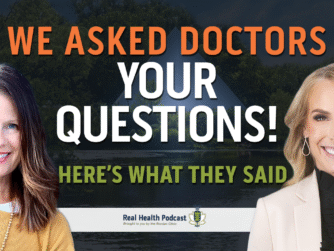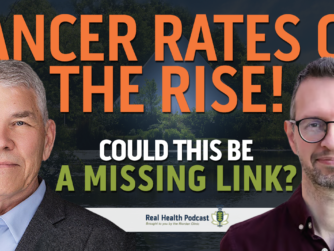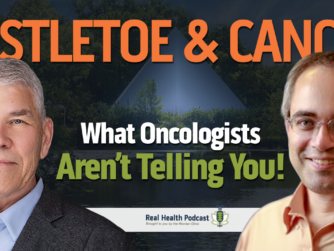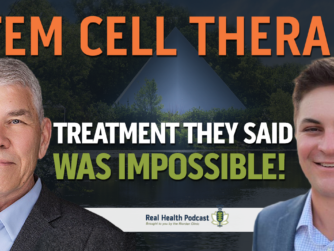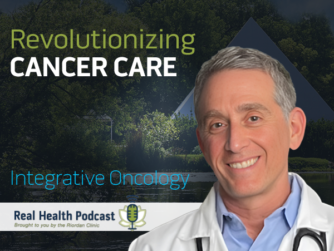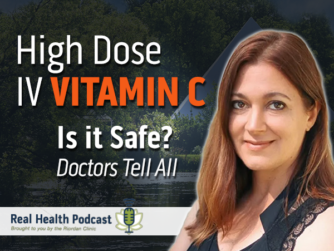In this episode of the Real Health Podcast, Dr. Ron Hunninghake, MD, discusses radical remission with cancer researcher Dr. Kelly Turner, PhD. Her first book is also titled “Radical Remission” and features stories of individuals who have survived cancer without conventional therapies or when conventional therapies failed. They discuss lifestyle changes that were consistent and why addressing emotions and practicing spirituality play a key role in achieving remission.
Watch the Podcast
Thank You to this Episode’s Sponsor
Bio-Center Laboratory
Links
Radical Remission Project: https://radicalremission.com/
About the Books: https://kelly-turner.com/books/aboutthebooks/
Docuseries: https://kelly-turner.com/docuseries/
Metabolic Approach To Cancer: https://www.drnasha.com/
PubMed: https://pubmed.ncbi.nlm.nih.gov/
Share your Radical Remission story: https://radicalremission.com/
Episode Transcript
Disclaimer: The information contained on the Real Health Podcast, and the resources mentioned, are for educational purposes only. They are not intended as, and shall not be understood or construed as, medical or health advice. The information contained on this podcast is not a substitute for medical or health advice from a professional who is aware of the facts and circumstances of your individual situation. Information provided by hosts and guests on the Real Health Podcast, or the use of any products or services mentioned, does not create a practitioner-patient relationship between you and any persons affiliated with this podcast.
Intro: This is the Real Health Podcast, brought to you by Riordan Clinic. Our mission is to bring you the latest information and top experts in functional and integrative medicine, to help you make informed decisions on your path to real health.
Dr. Ron Hunninghake: Hello everyone again. This is Dr. Ron Hunninghake. This is our Real Health podcast, coming from the Riordan Clinic in Wichita, Kansas. And it’s my real pleasure, it’s my real pleasure today, to have our guest, Dr. Kelly Turner. And she goes by Kelly. I go by Dr. Ron. But Kelly, you have written an incredible book that we want to talk about today, called “Radical Remission.” And I think many of our patients, who we refer to as co-learners, they’re probably aware of it, but I thought what we would do is just chat a little bit about it, because I think it adds a very important dimension to what cancer patients are thinking about, and looking for guidance in. And so could you tell me first a little bit about … Welcome, tell me a little bit about yourself.
Dr. Kelly Turner: Yeah. Thanks so much for having me, Dr. Ron. I’ve heard about your clinic and I’m so excited to hear more about it today. So I’m a cancer researcher, I have a PhD from UC Berkeley, where I looked at cases of spontaneous remission. That’s what they call it in the medical field. I don’t call it spontaneous remission from cancer anymore. I call it radical remission. And spontaneous remission or a radical remission, is someone who heals from cancer without any conventional medicine, or after conventional medicine has done all that it can, and it fails, so they have to turn to other options.
Dr. Kelly Turner: I also study a third group of radical remission survivors, which are statistically unlikely remissions. And that means, anyone that heals from a cancer that has a less than 25% five-year survival rate. And that would be something like pancreatic cancer, or stage four lung cancer. And so for those patients, even if they’re combining the best of conventional medicine with the 10 lifestyle changes that I’ve discovered in my research, when people combine things at the same time, skeptics will say, “Well, how do you know it was the 10 things? Maybe it was just the chemo.” When someone’s healing from pancreatic cancer, they are just beating the odds no matter what. So however they’re healing, I want to study them.
Dr. Kelly Turner: So I’ve, for the past 15 years, been studying these beating the odds, radical remission survivors, and learning what they do. And after my initial round of research, I discovered there were some common threads. There are actually 10 common threads, 10 things that they all do to help themselves get well. And before we go any further, I just want to say, I am not against conventional medicine. I am not against chemo, surgery, or radiation. I just happen to study the rare group of people who heal without it, because before me, no one was studying them. And if we just ignore these seemingly miraculous cases of healing, we’re never going to learn from them. And it turns out, they’re not overnight miracles. These people make 10 dramatic lifestyle changes to stimulate their own immune system, and it usually takes on average in a year and a half for them to get to a point of remission. So there’s really nothing spontaneous about it, which is why I call it radical remission.
Dr. Ron Hunninghake: And that’s why we prefer the term integrative oncology, here at the Riordan Clinic, because we do want to integrate with whatever the patient is doing. Dr. Riordan used the term co-learners because what it did is it broke down barriers. In many cases, patients feel like, “I’m just the patient and you’re the doctor.” Well, it turns out that whatever kind of cancer you have, it’s going to be unique to you. Even if it’s pancreatic cancer, there’s going to be 10 different people that have pancreatic cancer, and they’re going to have 10 different life situations, they’re going to have 10 different biochemical factors. They may have 10 different relationship situations, issues, whatnot. All of these things are what you and I address with our patients as we help to tease out, what are the things that they can do that can make a difference?
Dr. Ron Hunninghake: And it’s too bad we have to call this radical remission, because unfortunately, the whole idea of remission in cancer, it’s not as common as we would like to see it. A lot of people, when they get the diagnosis, they feel like, “Oh my gosh, it’s just a matter of time before I’m a goner.” And so I think one of the huge things that both of your books offer people is a renewed sense of hope that hey, there are people that, they were given the C word, and they didn’t just sit back. And a lot of them, in at least your first book, which I listened to yesterday, they were stage three, stage four, and they had been told there wasn’t anything else to do. And they were still able to recover.
Dr. Kelly Turner: Absolutely.
Dr. Ron Hunninghake: That should be something of great interest to a lot of people listening to this. So again, what was it that brought you into this? Why did you even become a researcher in the area of cancer?
Dr. Kelly Turner: Well, I lost a friend of mine to cancer when we were 16. So he was diagnosed when we were 14. He was diagnosed out of the blue with stomach cancer, of all things. So a very sporty, healthy, seemingly healthy 14-year-old boy had stomach aches that wouldn’t go away, and it turned out to be stomach cancer, and after trying all the surgery, radiation, and chemo that the doctors offered him, it didn’t work, and he did pass away when we were both 16. So that really stuck with me, just as, “Wow, this disease can come on all of a sudden, it can take anyone, even a young healthy boy.” And I felt very helpless with it. And I wanted to find a way to give back and find a way to not feel so helpless.
Dr. Kelly Turner: So I actually went back to UC Berkeley for my master’s in counseling, and my initial plan was just to counsel cancer patients, help them emotionally through that experience, see if I could give back in that way. And during that time, while I was getting my master’s, I read a case of radical remission. It was the first one I had ever read, and I just couldn’t believe it. I couldn’t believe that this man named Shin had been diagnosed with stage four kidney cancer and sent home to die, and then three years later, walked back into his doctor’s office with no evidence of disease. And I just said, “How did that happen? I have so many questions for this man.” And then I went on to PubMed that night, which is like the Google for medical studies, and I found that there were over 1,000 of these cases –
Dr. Ron Hunninghake: Wow.
Dr. Kelly Turner: … published in medical journals from as early as 1880. So basically, as soon as medical journals started to be published, cases of spontaneous remission were published in them. And I thought, “I have to study this. No one is studying this. They’re publishing the reports here and there. Every now and then, someone’s publishing a case report, but they have no clue as to how this person healed.” And of course, as a therapist, I was being literally trained to ask questions and listen. So it was just a natural fit for me to do this research, so I went on for my PhD and found these radical remission survivors from all around the world, and I also interviewed their healers. And I simply said, “Why do you think you healed? Your doctor has no clue. So there’s really no point in me talking to them. I want to talk to you, the co-learner, the expert. What did you do? Tell me everything you did, even if you think it didn’t have any impact. I just want to know every change you made.”
Dr. Kelly Turner: And we got into, of course, their diet and their exercise and the physical changes they made. But honestly, most of our interviews talked about the psychological shifts they made, the spiritual shifts they made. Because that, in their opinion, was critical for their healing.
Dr. Ron Hunninghake: Yeah, this is good, because we work under Dr. Nasha Winter’s Metabolic Approach, which are the 10 terrains. And there are a couple of that deal with the psychological. I would even call it the psychospiritual, self-image, relationships, all these things that are interior to people, a little harder to get to, and a lot of times people don’t know if they want to talk about those things, but I guess as a counselor, that was your territory to explore with these patients. And so, what were some of the things you discovered that they did, that helped them to beat the odds? This was what Dr. Riordan’s famous term is, “We’re here to help patients beat the odds.” What was it that was there that would help our patients now, if they knew about these?
Dr. Kelly Turner: Well, of the 10 common factors that I found, seven of them were mental, emotional, spiritual. So there’s plenty of examples we can talk about. One of the seven things is releasing suppressed emotions. So that’s releasing anything that you’re holding onto, whether it’s fear or stress or anxiety about the future, or resentment about the past. Any sort of emotion that’s stuck in you.
Dr. Kelly Turner: And for example, one of the gentlemen that I filmed for my upcoming docuseries, so this is a radical remission survivor, that I was able to go to his house in film our interview. Beautiful soul, beautiful man named Yokanon. He was diagnosed with multiple myeloma, which, as you know, Dr. Ron, is incredibly fatal, in terms of conventional medicine. There’s really not good treatment or cures for it.
Dr. Ron Hunninghake: My father died of it, so I’m very much aware of it. But –
Dr. Kelly Turner: Oh my goodness.
Dr. Ron Hunninghake: We can come back to that later. Yeah.
Dr. Kelly Turner: Okay. Yeah. Okay. So Yokanon was diagnosed with multiple myeloma, and he was given three months to live. He did try chemotherapy, he was unable to tolerate it, so he chose to stop it, and was essentially sent home on hospice care. Instead of that, he chose an integrative path, and he went to an integrative clinic down in Mexico that was doing some pioneering treatments. So he did their physical treatments, the different IV infusions and BioMat and water stuff and all that. But he also had a lot of time on his hands. He was there for four weeks, and just waiting for these IVs to drip in, and he used that time to really dive into the emotions that were stuck in his body.
Dr. Kelly Turner: And this is a black gentleman who was born on the streets of LA, in south LA, in a gang-riddled neighborhood, in the 1980s. So there was a lot of drugs, he was exposed to a lot of police brutality, and he had a lot of abuse in his own family. So here he is now, in his late 30s, and he’s just using that moment down in Mexico to go back and relive all of these traumas from his youth and find a way to release them and find a place of forgiveness, to all the people and all the aspects of society that really hurt him. And that, what he calls his shadow work, Jungian shadow work, was very pivotal for his healing process. So the physical was important, so was that emotional healing. Because before he really dove into that shadow work, he didn’t realize how much anger and grief and hurt was locked up in his mind-body system.
Dr. Kelly Turner: So people that I study release these suppressed emotions in a lot of ways. Sometimes they just journal, sometimes they talk to a therapist, sometimes they go to specialized therapists like an EMDR therapist or an EFT tapping therapist. Really, you just have to find whatever works for you. But finding a way to let these suppressed emotions get unlocked, from wherever you’re holding them in your mind or body, look at them, honor them, process them, and then ideally, release them. That seems to be a very key part of the radical remission healing process. And for Yokanon, that helped him a lot. He’s alive and well now, five years later. After being given three months to live. So it’s a pretty incredible turnaround.
Advertisement: There’s a lot more to this conversation, and it’s coming up right after a quick break. Today’s podcast is brought to you by LivOn labs, makers of liposomal vitamins and supplements. LivOn uses a liposomal encapsulation technology to protect nutrients from destruction in the digestive system. This allows for more efficient delivery of essential vitamins and nutrients. Choose from various supplements that support health and wellbeing, such as Lypo-Spheric Vitamin C, magnesium, glutathione, and more. To learn more, visit livonlabs, that’s L-I-V-O-N labs.com.
Dr. Ron Hunninghake: In my lectures, I often refer to cancer as the non-healing wound. I’m thinking of it in terms of biochemical factors and nutritional factors, but here you’re talking about emotional factors, and previous trauma and in their lives. And we all know as physicians, if you’ve got an abscess, you have to open it, and let it drain. And so this is something that I find that a lot of conventional oncologists, they really don’t want to get into that. They’re all about taking care of the cell … Not taking care of the cell, killing the cell. Killing the cancer cell. And so in the process, the wound oftentimes gets further traumatized and deeper. And so to have someone who can … To even bring it up and be willing to talk about it, it provides oxygen, in a metaphorical sense, to the body. And we know physiologically, if there’s a lack of oxygen to the mitochondria, the source of energy in the body, they can’t breathe and they go into a whole different type of metabolism that is cancerous.
Dr. Ron Hunninghake: And so this idea of giving people space and oxygen, freedom to open up and explore this, can be a really important part of the cancer journey that you certainly do endorse in your book. And I think more patients need to look into this, because oftentimes, we’re so busy doing what we do, that we don’t think that maybe there’s another layer, a deeper layer that needs to be explored.
Dr. Kelly Turner: Absolutely. And for any doctors or co-learners out there, patients who are skeptical about, “Well, how could working on my past emotional traumas impact today’s cancer in my body?” I always like to remind people, the mind-body connection is absolutely a scientific fact. There is no denying that our thoughts and our emotions create hormonal states in our bloodstream that directly impact the immune system. So for example, we know that a six-week, mindfulness-based [inaudible] cancer patients take, significantly increases the number of natural killer cells in their immune system. It also increases their telomere length. So these are cellular changes that are happening to help their own body fight cancer. So they’re strengthening their own immune system by working on improving their emotional state.
Dr. Kelly Turner: Another great one is beginning meditators, or people who had never meditated before, were taught how to meditate 30 minutes a day. In just eight weeks, they turned off their oncogenes, their cancer genes. So this idea that making a change in the mind, whether it’s processing your old trauma, or reconnecting to things that bring you joy, the idea that those things have an impact on your physiology, including the physiology or your immune cells, is not up for debate at all. We know that when we get into a state of relaxation or happiness, we are flooding the bloodstream with endorphins. serotonin, relaxin.
Dr. Kelly Turner: I don’t need to tell you this, Dr. Ron, but what maybe people don’t understand is that we have additional studies showing that, for example, oxytocin has been shown to prevent the spread of breast cancer cells in the body. So oxytocin, the cuddle hormone or the love hormone, people think, “Oh, well, it’s nice to get hugs. It’s nice to feel loved. That’s helpful and that’s supportive during a cancer journey.” Well, now it’s actually helping your cancer cells to stop from growing. So it actually helps you during your healing journey, all the way down to the cellular level. And that’s empowering knowledge. Because your patients can’t give themselves chemo. They can’t give themselves surgery. They don’t own a radiation machine at home. But they can work on their emotions at home. They can improve their diet at home. So these 10 healing factors that radical remission survivors do, they are 10 things that anyone can do, to improve their immune system. And that’s empowering. That alone gives you hope.
Dr. Ron Hunninghake: Dr. Riordan, who is the founder of the Riordan Clinic, used to say that we need eight hugs a day just to be normally healthy. And if we have a serious illness, we may need many more than that. And I think one of the things that people forget that when someone has cancer, there unfortunately can be an alienation process going on within their family, within their friends, because people are afraid of cancer. People, even though we know you can’t catch cancer, there’s still the fear element there. And so this isolation becomes yet another trauma that the cancer patient emotionally can’t breathe. They can’t get what they need in order to feel part of a community again. So for the people that are listening or watching, please, you need to be willing to open up to your family who … Anyone who has cancer, they need more help than others.
Dr. Ron Hunninghake: Now, in your book, the people that you highlighted, they actually sought out community. They sought out friends and people who would open up. And once people open up, it’s a whole new ballgame.
Dr. Kelly Turner: Absolutely. And every radical remission survivor that I’ve interviewed handles things a little differently. Some of them don’t tell many of their friends and family that they have a cancer diagnosis. They don’t want that instant fear, or even pity, to just be instantly put on them. So some of the people I’ve studied and interviewed are very selective about who they tell. And other people share a blog with the whole world on the internet. But the common thread here is finding the right sources of support. So actually, one of the 10 common healing factors is increasing social support. So that can be friends and family, it also can be a pet. We’ve learned that simply having a pet helps you live significantly longer. There are tons and tons of studies showing that. And we also have studies showing that loneliness kills. People who rate themselves as lonely are predicted to end up dying significantly sooner than people who rate themselves as not lonely at all.
Dr. Kelly Turner: So this idea that, being open and saying, “I need some support, I need some help with this scary time or this challenging health diagnosis,” it’s actually going to help you survive it, if you are brave enough to ask for that support. And one of the women featured both in my first book, “Radical Remission,” and in the upcoming docuseries, is a beautiful woman, beautiful soul, beautiful woman, beautiful all around, named Catherine. She was diagnosed with stage three liver cancer when she was in her early 60s, single, divorced, and had unfortunately lost one of her two children to suicide. So she was feeling very alone. And also, due to her job situation as an adjunct professor, she didn’t have benefits. So here she is, living alone, unable to work now because she’s so sick, she doesn’t have Medicare yet because she’s not 65, and she didn’t have health insurance because she was an adjunct faculty member, and they didn’t give her benefits.
Dr. Kelly Turner: So she literally says in the docuseries, “The only way I was going to live is if people helped me. I was completely alone with zero resources. I was only going to live if people helped me and supported me.” And she said asking for help was a big challenge for her, a big hurdle, but once she did, she was part of a church community. The support just came flooding in. People gave her financial resources to get the integrative treatment she wanted, they helped repair her house, they drove her to appointments. And she said, sure, the integrative treatments were crucial in her opinion, but the love and support that she felt from this community, she’s like, “I didn’t feel alone. I felt loved. I felt important. I felt that people wanted me to stick around.”
Dr. Kelly Turner: And feeling that way, as you and I know biologically, is significantly increasing your endorphins and your oxytocin, and your serotonin. So that is literally boosting your immune system so that it can identify and remove cancer cells from your body. That’s why this idea of asking for social support, asking for help from your loved ones, is so important for your healing journey. And she’s alive and well now. No more liver cancer.
Dr. Ron Hunninghake: It’s interesting, sometimes people try so hard with their cancer, to survive, that they’re actually triggering the part of their autonomic nervous system which is fight or flight. And so if you can help people to learn techniques, or to get support, social support, to shift into parasympathetic, which is a rest and digest and heal type of system, that can be very, very, very helpful.
Dr. Ron Hunninghake: We’re running out of time. I’d love to talk to you all day. Me. Let’s just end on this thing that I think is really important, your discussion of deepening your spiritual connection. And you are very good in the book about helping people to understand that not everyone has the same understanding of what spiritual means. It’s different for different people. So how would you explain that so that people could feel comfortable with the idea? And what is it about the spiritual connection that’s so important in this radical remission idea?
Dr. Kelly Turner: That’s a wonderful question, Dr. Ron. So in my research, radical remission survivors come from all different countries, all different ages, all different cancer types, and all different religions.
Dr. Ron Hunninghake: Right.
Dr. Kelly Turner: Including agnostics. So it’s very important to know that this healing factor of deepening your spiritual connection practice, can apply to any religion, including agnosticism. And what it means, and I’ll repeat it again, it’s deepening your spiritual connection practice.
Dr. Ron Hunninghake: Practice. There you go.
Dr. Kelly Turner: Practice. And the reason that’s so important is because, what radical remission survivors are doing is they’re doing some sort of practice, whether it’s meditation, or prayer, or gardening, or running. Whatever it may be, they’re doing –
Dr. Ron Hunninghake: Walking in the woods.
Dr. Kelly Turner: Yes, they’re doing something that quiets their mind and quiets the physiological processes of their bodies and turns on different physiological processes. So it really is a physical change in your body. I think some people, they hear that word spirituality and they think, “Oh, I have to believe in God, or I have to a belief of some sort.” And that’s not what radical remission survivors are doing, or espousing. What I’m observing from them, is they’re doing some sort of activity that changes their mind and their body at the same time, in a very health-inducing way. And what I mean by that is, when we take meditators and we hook them up to FMR machines, we see that the parts of their brain in the frontal cortex that have to do with planning and logistics and thinking about your shopping list, they go quiet. And the parts of your brain that have to do with love and compassion, and making connections between different concepts in your brain, those light up.
Dr. Kelly Turner: So before, when you’re talking about sympathetic and parasympathetic nervous system, when you do your prayer, or your meditation, or your gardening, or you’re walking in the woods, you are switching out of fight or flight, out of that sympathetic nervous system, and into the parasympathetic nervous system. And the benefits are incredible. As researchers, we’re just starting to understand the incredible physiological, physical benefits, of having a practice like that. And so anything that allows you to slow and deepen your breathing, anything that allows your busy thoughts to get really, really quiet, if you can get to a place of mental quiet and deep breathing, whatever that is, meditation, prayer, painting, running, I don’t care, you are entering into a healing state that is incredibly potent. And every single radical remission survivor that I’ve studied has found a way to get into that healing state.
Dr. Kelly Turner: A great example of this for the docuseries, there’s a gentleman that I filmed named Ken, who was diagnosed with stage three esophageal cancer. Esophageal cancer is usually a very fast-growing, difficult-to-treat cancer. And before the surgery was set, he said, “I just want a few months to just try to get my act in order.” So he cleaned up his diet, and he really started meditating, and it was like a combination of meditation and prayer, but he really decided to do it for many minutes a day, half an hour in the morning, half an hour at night, and then multiple times throughout the day, he would just try to close his eyes and take some deep breaths.
Dr. Kelly Turner: He even brought some visualization into it where he imagined just healing energy flowing in from the top of his body and flowing down through it, really deepening this practice of deep breathing and using this imagery to get his body into this relaxed, flowing state. And two months later, when the surgery finally happened, they went in, there was no cancer there. They took some samples anyway, just to be like, “What’s going on here?” They sent the samples in, no evidence of cancer. They even took the initial samples from the biopsy and resent those in to make sure they hadn’t made a mistake. Because the doctor was so confused. And they said, “No, you really did have stage three esophageal cancer two months ago.” And now after these two months of intense spiritual connection practice, combined with diet and the other eight factors, he was able to then basically not need a surgery and have no evidence of disease.
Dr. Kelly Turner: So it usually doesn’t work quite that fast, two months is really on the fast side for things, but it just does go to show you the power of getting into that spiritually connected state. Or if you don’t like the word spiritual, just say deep breathing and absence of busy thoughts. That’s a magical state for your body to get into.
Dr. Ron Hunninghake: Wonderful. Well, I encourage all of our listeners to open your minds and open your hearts and pick up a copy of the “Radical Remission” book. And you’ve got a new one, “Radical Hope.”
Dr. Kelly Turner: Yes. “Radical Hope” came out right before lockdown in 2020, so not many people know about it, but it’s 10 more wonderful cases of radical remission. So it’s more hope, and also updated research, all the latest studies on these 10 factors.
Dr. Ron Hunninghake: So our goal here is to be as healthy as possible, so let’s all get radically healthy. And thank you –
Dr. Kelly Turner: Wonderful.
Dr. Ron Hunninghake: … for what you’ve done, and I commend you, and I hope, anything we can do to support you, we’re happy to do it. So keep up the good work.
Dr. Kelly Turner: Wonderful. Thank you Dr. Ron. And thanks for all that you do at your wonderful clinic. You are actually helping people on the ground live these 10 factors, and that’s where the magic happens.
Dr. Ron Hunninghake: You bet. Thanks, Kelly.
Dr. Kelly Turner: Thanks for having me.
Outro: Thank you for listening to the Real Health Podcast. If you enjoy this episode, be sure to subscribe and leave us a review. You can also find all of the episodes and show notes over at realhealthpodcast.org. Also, be sure to visit Riordanclinic.org, where you will find hundreds of videos and articles, to help you create your own version of real health.


